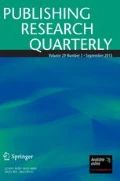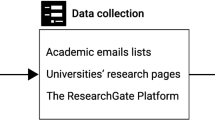Abstract
Over the past two decades, sales of monographs have shrunk by 90 % causing prices to rise dramatically as fewer copies are sold. University libraries struggle to assemble adequate collections, and students and scholars are deprived access, especially in the developing world. Open access can play an important role in ensuring both access to knowledge and encouraging the growth of new markets for scholarly books. This article argues that by facilitating a truly global approach to funding the up-front costs of publishing and open access, there is a sustainable future for the specialist academic ‘long form publication’. Knowledge Unlatched is a new initiative that is creating an international library consortium through which publishers will be able to recover their fixed costs while at the same time reducing prices for libraries.
Similar content being viewed by others
Notes
Participating publishers would include university and commercial presses, and others. The initiative is meant to scale and could eventually include a significant proportion of the specialised scholarly monographs currently published.
Content would include scholarly monographs and specialised academic titles. A number of straight forward technologies exist to enable publishers to fulfil orders for their titles via the programme, or a partnership with an existing aggregator may be possible. The principal criterion of any fulfilment process would be to keep costs low.
The publisher’s price would reflect its fully loaded first copy costs, plus an operating margin. By logical extension, a publisher’s operation would be sustainable were it to sell all of its titles under this model.
In the U.S., the likely target audience would be primarily (but not exclusively) the libraries in Carnegie Classes 15–17 and Carnegie Class 23. In the UK and Europe the target audience would be university research and teaching libraries.
Knowledge Unlatched to coordinate library participation, probably in conjunction with North American, European, and Australasian consortia. The transaction costs would need to be minimal.
To accelerate and simplify the process, an online selection system would allow the libraries to inform Knowledge Unlatched which titles they would be willing to purchase at the stipulated price(s). The library buying group could set the minimum number of libraries required to enable the purchase to be made (e.g., all titles selected by X% or more of the participating libraries).
The library review and selection process would provide a market demand mechanism sufficient to ensure that publishers provide books of sufficient quality.
There would be no volume discount based on the number of titles selected, as the publishers’ costs are not volume driven—although other incentives will be introduced, such as additional discounts on other products.
The OA version could be PDF, HTML, or some other suboptimal digital format. The licensing would be under a Creative Commons or equivalent open content licences. (The degree of restriction, e.g. non-commercial or no derivatives to be specified by the publisher.).
The value-added versions of ebooks provided to participating libraries would need to provide an exclusive benefit of sufficient value to overcome free ridership. This might include EPUB and/or other desired digital formats, a preferential price on POD or other print editions to member libraries. Other exclusive benefits may include extra metadata/cataloguing, delivering data to library discovery tools. Preferential discounts on other products may be offered.
References
http://www.arl.org/resources/pubs/specscholmono/wasserman~print.shtml.
Watkinson A. Campus based publishing. A presentation to the meeting of LERU at UCL on the Future of Scholarly Publishing 28 Nov 2011 (2011). http://www.leru.org/index.php/public/extra/cio-28112011.
Willinsky John. J Electron Publ. 2009;12(1):2.
http://www.lib.berkeley.edu/scholarlypublishing/monographs.html.
Author information
Authors and Affiliations
Corresponding author
Rights and permissions
About this article
Cite this article
Pinter, F. Open Access for Scholarly Books?. Pub Res Q 28, 183–191 (2012). https://doi.org/10.1007/s12109-012-9285-0
Published:
Issue Date:
DOI: https://doi.org/10.1007/s12109-012-9285-0




